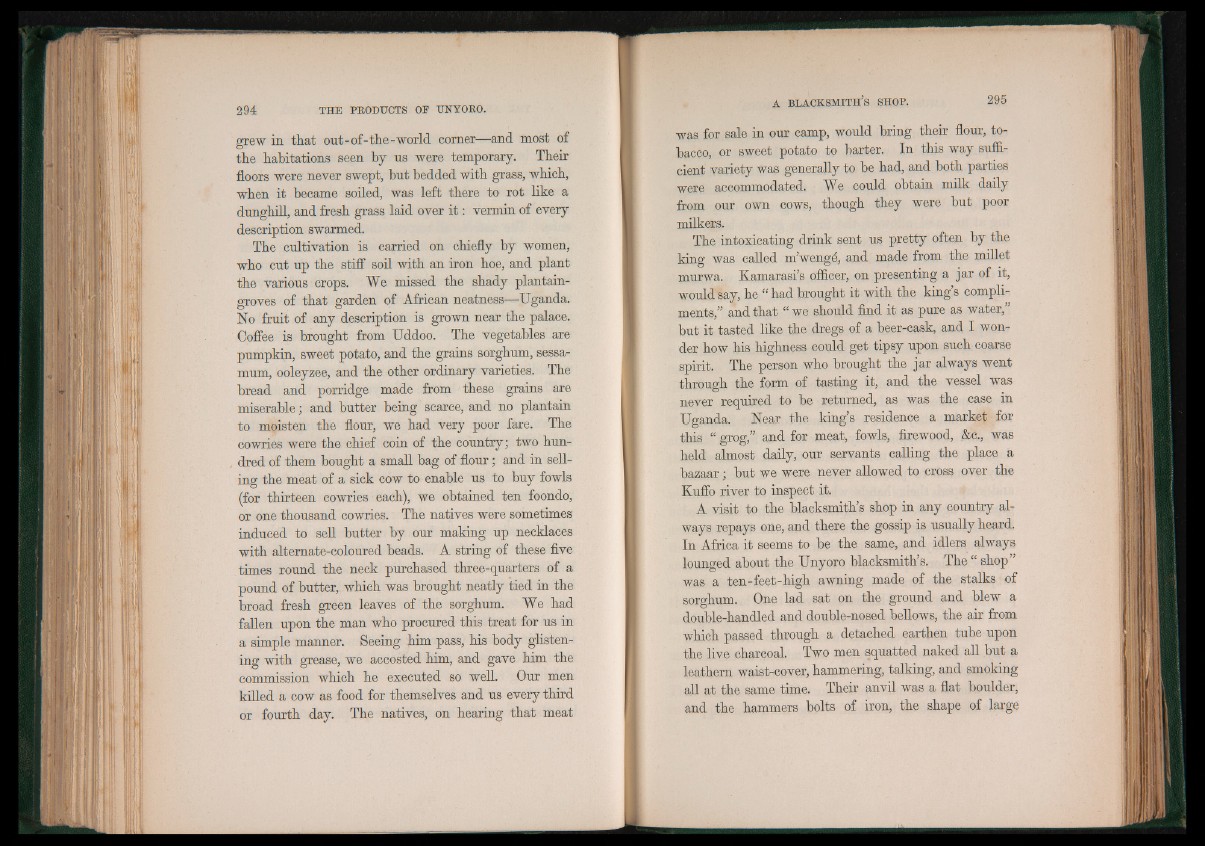
grew in that out - of-the - world comer—and most of
the habitations seen by us were temporary. Their
floors were never swept, hut bedded with grass, which,
when it became soiled, was left there to rot like a
dunghill, and fresh grass laid over i t : vermin of every
description swarmed.
The cultivation is carried on chiefly by women,
who cut up the stiff soil with an iron hoe, and plant
the various crops. We missed the shady plantain-
groves of that garden of African neatness—Uganda.
No fruit of any description is grown near the palace.
Coffee is brought from Uddoo. The vegetables are
pumpkin, sweet potato, and the grains sorghum, sessa-
mum, ooleyzee, and the other ordinary varieties. The
bread and porridge made from these grains are
miserable; and butter being scarce, and no plantain
to moisten the flour, we had very poor fare. The
cowries were the chief coin of the country; two hundred
of them bought a small bag of flour; and in selling
the meat of a sick cow to enable us to buy fowls
(for thirteen cowries each), we obtained ten foondo,
or one thousand cowries. The natives were sometimes
induced to sell butter by our making up necklaces
with alternate-coloured beads. A string of these five
times round the neck purchased three-quarters of a
pound of butter, which was brought neatly tied in the
broad fresh green leaves of the sorghum. We had
fallen upon the man who procured this treat for us in
a simple manner. Seeing him pass, his body glistening
with grease, we accosted him, and gave him the
commission which he executed so well. Our men
killed a cow as food for themselves and us every third
or fourth day. The natives, on hearing that meat
a blacksmith’s shop. 295
was for sale in our camp, would bring their flour, tobacco,
or sweet potato to barter. In this way sufficient
variety was generally to be had, and both parties
were accommodated. We could obtain milk daily
from our own cows, though they were but poor
milkers.
The intoxicating drink sent us pretty often by the
Iring was called m’wengd, and made from the millet
murwa. Kamarasi’s officer, on presenting a jar of it,
would say, he “ had brought it with the king’s compliments,”
and that | we should find it as pure as water,”
but it tasted like the dregs of a beer-cask, and I wonder
how his highness could get tipsy upon such coarse
spirit. The person who brought the jar always went
through the form of tasting it, and the vessel was
never required to be returned, as was the case in
Uganda. Near the king’s residence a market for
this “ grog,” and for meat, fowls, firewood, &c., was
held almost daily, our servants calling the place a
bazaar; but we were never allowed to cross over the
Kuffo river to inspect it.
A visit to the blacksmith’s shop in any country always
repays one, and there the gossip is usually heard.
In Africa it seems to be the same, and idlers always
lounged about the Unyoro blacksmith’s. The “ shop”
was a ten-feet-high awning made of the stalks of
sorghum. One lad sat on the ground and blew a
double-handled and double-nosed bellows, the air from
which passed through a detached earthen tube upon
the live charcoal. Two men squatted naked all but a
leathern waist-cover, hammering, talking, and smoking
all at the same time. Their anvil was a flat boulder,
and the hammers bolts of iron, the shape of large